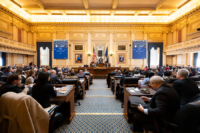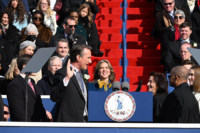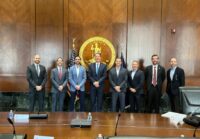Beyond Loudoun: Why data centers are seeking new markets
Tighter zoning and power limits in Northern Virginia are pushing data center developers to other regions across the state.
5 U.Va. board members resign at Spanberger’s request
The New York Times reported Friday evening that three University of Virginia board members have resigned at the request of Abigail Spanberger, who will be sworn in Saturday as Virginia's Democratic governor.
Virginia luxury packaging provider plans $34M HQ expansion
Infinity Global plans a $34 million expansion of its Danville headquarters, creating 150 jobs and more than doubling its Virginia workforce.
Annandale Millwork to add 154 jobs in Newport News
Annandale Millwork and Allied Systems Corp. will invest $11.5 million to expand operations in Newport News, creating 154 jobs.
Solstice Advanced Materials to invest $220M in Chesterfield expansion
Solstice Advanced Materials plans to invest $220 million to expand production at its manufacturing facility in Chesterfield County.
Spanberger talks economic priorities in exclusive Q&A
Virginia Gov.-elect Abigail Spanberger outlines her priorities on affordability, housing, federal funding cuts, energy policy and economic growth.
2026 Virginia General Assembly preview: Dems contend with tricky budget
With Abigail Spanberger set to become governor, Virginia Democrats enter the 2026 General Assembly session with control of state government and major budgetary challenges.
Youngkin’s term as governor marked by economic wins, political division
Gov. Glenn Youngkin leaves office after four divisive years marked by economic wins, veto power and political losses as Virginia turns to Abigail Spanberger.
Top Five: January 2026
1 | University board fight ends; Spanberger to fill 22 seats The legal battle between Gov. Glenn Youngkin and state Senate Democrats over university boards of visitors ended as both sides acknowledged the matter would be made moot by the new General Assembly session and change in gubernatorial administrations. (Dec. 9) 2 | SAIC shakes […]
LS Cable to add $689M factory in Chesapeake, creating 430 jobs
LS Cable & System is more than doubling its capital investment in Chesapeake manufacturing facilities and bringing its expected job creation to 760.
Avio USA picks Virginia for $500M solid rocket motor factory
Avio USA plans a Virginia solid rocket motor facility, committing up to $500 million to expand U.S. aerospace and defense production.
Eaton to invest $50M in Henrico expansion, adding 200 jobs
Eaton will invest over $50 million to expand its existing manufacturing footprint in Henrico County and create 200 jobs.























